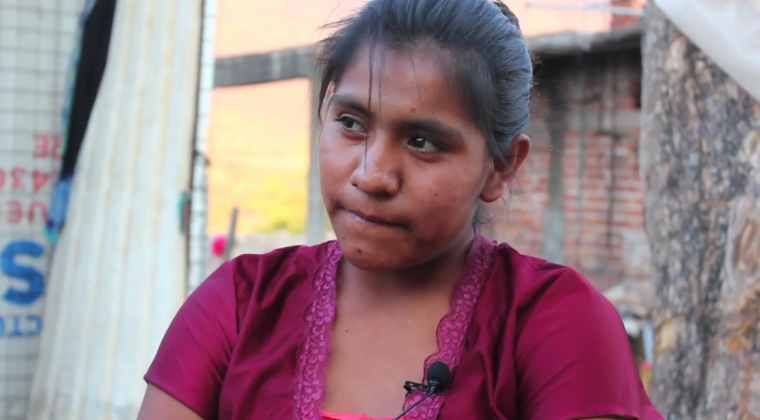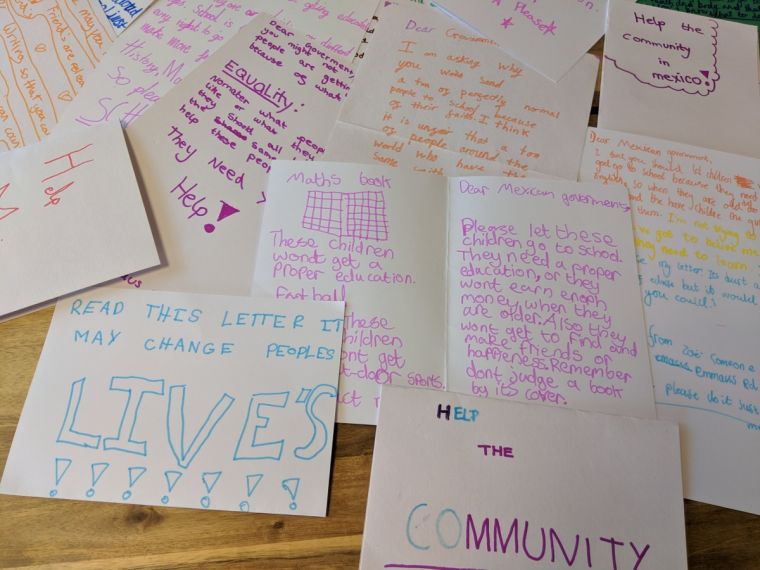In Mexico, children are missing out on education because of religious discrimination

Alma, 17, hasn't been able to enrol in school ever since her family was forcibly displaced from their village in December 2017.
Her family and around 60 others were made to leave their homes in Bolaños Municipality, Jalisco state, in the west of the country, because they are Protestant Christians.
According to Christian Solidarity Worldwide (CSW), religious minorities in Mexico have been forced to take part in religious activities that go against their beliefs and have faced insults and pressure - including at the hands of the authorities - to convert.
When they have refused, they have been deprived of basic services, such as the education of their children.
In some extreme cases, Christians have been forcibly displaced from their homes and, in the ensuing turbulence, the children have found themselves without the required paperwork to enrol in school after their families have settled elsewhere.
In Alma's case, by the time her family found a new place to live - in a disused church hall - she had missed the enrollment deadline.
CSW recently facilitated meetings with her pastor and government officials in Mexico City in an attempt to get her back into school, but over two years after she was displaced, she is still out of formal education.

CSW has been encouraging Alma and other children in similar circumstances by inviting members of the public to write letters to their Mexican embassies and hold 'solidarity parties'.
Despite the reality of her circumstances, Alma has not lost hope of one day being able to resume her studies.
"I have always wanted to be a nurse," she told CSW. "I plan to be a nurse and study a career, I am going to continue studying."
Impulso 18, a locally-based human rights organisation and CSW partner, is campaigning on this issue. It explains here how education is being used as a tool to discriminate against Protestant children.
CT: How many children are affected by this kind of education discrimination in Mexico?
Impulso 18: The government does not keep track of these numbers and there is not a central registry so the exact amount is hard to determine, but groups like Impulso 18 and CSW have documented multiple examples of this in the states of Chiapas, Hidalgo, Oaxaca and Jalisco.
Often children are unable to re-enroll in schools after they have been displaced as they don't have the paperwork they need. Sometimes this was lost during a violent forced displacement and sometimes it still exists but the family is prevented from returning to recover it.
Schools in the new community do not make allowances for the lack of paperwork.
CT: What kind of impact does it have on the children, both in terms of their personal development and emotionally-speaking?
Impulso 18: Children need to go to school to develop socially. When they can't, they lose their friends, their language. It also makes it harder for them to have a career.
Even if children are able to re-enroll, things can remain difficult for them. Because they are separated from their community of origin, classes may not be in their language. They may suffer bullying or feel alone and isolated.

CT: Are the children able to access any other form of education outside of school enrollment, such as homeschooling?
Impulso 18: In most cases, this is not possible because they do not have a house or a new school, or even a decent place to study. The idea of homeschooling sounds like a good one because native teachers may help them to accept and adapt to their new life, but the question is who would be able to provide homeschooling?
In most cases both parents have to work to provide for their families, so it is not possible for one to stay at home and teach their children.
Also, since the majority of displaced families come from poor communities, they cannot afford to buy the necessary resources for homeschooling. And many parents may be only semi-literate or illiterate themselves.
CT: Presumably, the children will be behind other children their age if and when they are able to return to school?
Impulso 18: Yes, of course because they miss out on years of classes. Most of those affected are from impoverished backgrounds. On the rare occasion that they they can go back to their hometowns, first they have to help their families to rebuild their houses and spend some time working for the family and then go back to school.
CT: Why is this form of discrimination happening?
Impulso 18: Because of the differences in their religious beliefs. Mexico's Law of Uses and Customs allows indigenous communities to govern themselves according to traditional laws and customs. The law is meant to be applied in accordance with the constitution, but in reality the government does little to enforce this at the state or federal level. As a result, the rights of religious minorities are often violated.
Communities that convert away from the majority religion in areas governed by the Law of Uses and Customs experience a wide range of violations, including discrimination, violence, illegal fines, cutting of basic services, denial of access to education, arbitrary detention and forced displacement. Most violations take place at the local village or municipal level, but state governments and the federal government have largely failed to hold those responsible to account.
CT: Is this happening all across Mexico and is it affecting all Christians or just Protestants?
Impulso 18: This discrimination takes place in all the country and predominantly affects Protestant Christians, but there are cases where Catholics are affected too. And it is both in the cities and out in the rural areas. Some states like Oaxaca, Chiapas, Hidalgo and Jalisco suffer more because they are more isolated and sometimes unaware of their rights, and it is more difficult for communities to access justice, as many local authorities lack an understanding of freedom of religion or belief (FoRB), and how the Law of Uses and Customs must be applied in accordance with Mexican constitutional law.
CT: Children in countries that enjoy religious freedom have been writing letters to Mexican embassies protesting the discrimination. How important is it for the affected children to feel the solidarity of other children and supporters worldwide?
Impulso 18: It can make a difference because children can feel supported by other children of their age. It shows them that they are not forgotten or alone, as much as it may feel like that at times. It can reassure them that their voices are being heard and their cases are being raised with people in power, giving them hope that their situations may improve.
CT: What change do you want to see in Mexico so that children and their families will not suffer because of their faith?
Impulso 18: We need to apply the law in all levels and at the political, social and religious areas. The Mexican government fails to treat violations like these as actual crimes, which has created extremely high levels of impunity and the breakdown of rule and law. People often attempt to justify crimes by saying they were done under the Law of Uses and Customs and/or for religious reasons, prompting the government to treat the crime differently.
State government narratives about violations of freedom of religion or belief (FoRB) are often confusing and contradictory, and are frequently aimed primarily at reducing the number of reported cases. This along with a lack of proper investigations means that a culture of impunity surrounds the majority of cases.
The government needs to ensure that they have a FoRB expert on hand to review any agreements made to resolve cases and make sure they are in line with the Mexican Constitution and international law. This is the only way to guarantee public security in the long term.
If perpetrators of crimes are not prosecuted, crimes will be committed again; a culture of impunity becomes the norm when there is no justice for victims. And 'religious reasons' or 'in the name of Uses and Customs' are insufficient reasons to leave crimes unpunished.
There is a need for the government to make a national campaign for human rights, especially dedicated to religious freedom. It is particularly important that children are taught about these matters.











